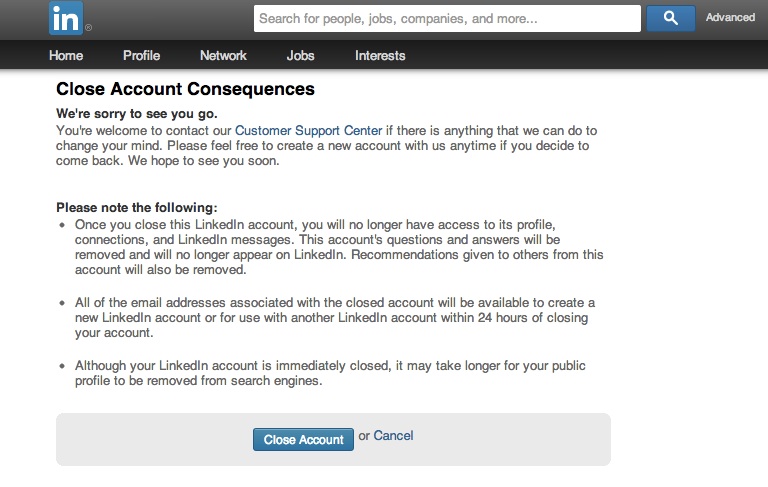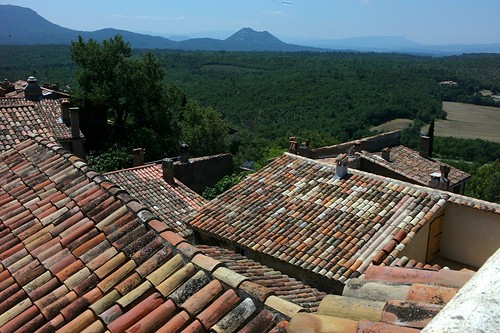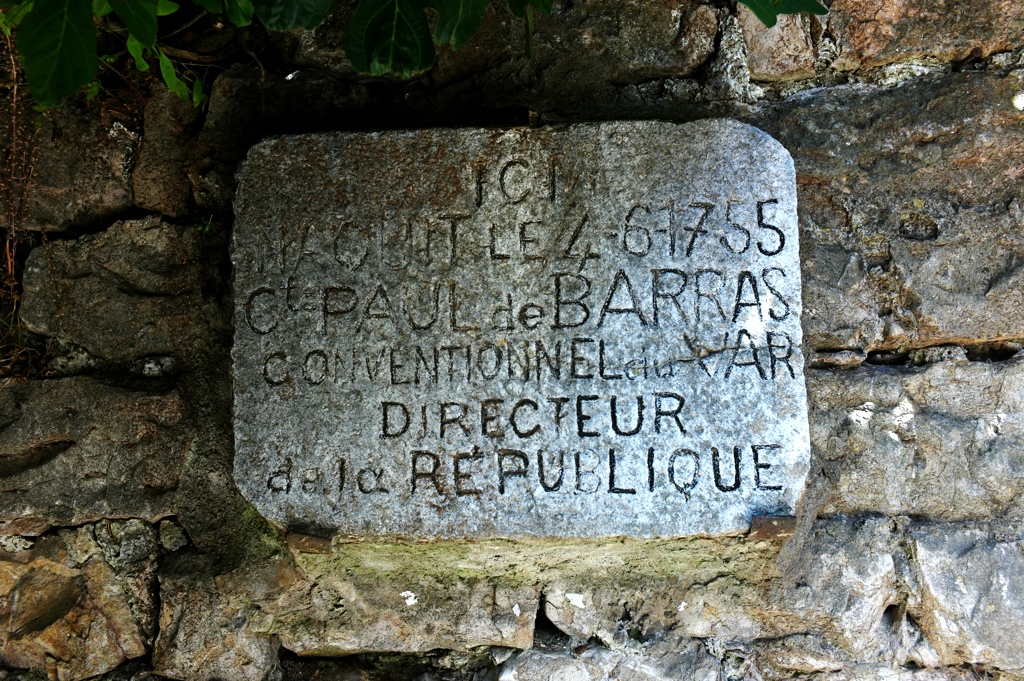LinkedOut
As readers of this blog will know, I have a low opinion of LinkedIn, which I consider to be one of the most annoying, intrusive and useless online services in existence. (See here and here, for example.) So today, after yet another of my hapless connections had “endorsed” me for something for which I had never requested an endorsement I finally got round to deleting my account. The ensuing dialogue box contained this interesting information.
The second bullet-point has a vaguely menacing tone. Does it imply that someone else can use my email address(es) to open a (fake) LinkedIn account in my name? Or is it simply saying that I can always think again and use my email address to get back in?
Engineering ethics
Joe Bonneau is one of the smartest young people I’ve met. He was a Gates Scholar at Cambridge and did a PhD in Ross Anderson’s group in the Computer Lab. On July 18, his paper on “The Science of Guessing” won a prestigious award as the Best Scientific Cybersecurity Paper of 2012. But here’s the catch: the Award, which is judged by a panel of distinguished academic experts, is sponsored by the NSA!
Here’s how Joe blogged about it, and explained his thinking.
I’m honored to have been recognised by the distinguished academic panel assembled by the NSA. I’d like to again thank Henry Watts, Elizabeth Zwicky, and everybody else at Yahoo! who helped me with this research while I interned there, as well as Richard Clayton and Ross Anderson for their support and supervision throughout.
On a personal note, I’d be remiss not to mention my conflicted feelings about winning the award given what we know about the NSA’s widespread collection of private communications and what remains unknown about oversight over the agency’s operations. Like many in the community of cryptographers and security engineers, I’m sad that we haven’t better informed the public about the inherent dangers and questionable utility of mass surveillance. And like many American citizens I’m ashamed we’ve let our politicians sneak the country down this path.
In accepting the award I don’t condone the NSA’s surveillance. Simply put, I don’t think a free society is compatible with an organisation like the NSA in its current form. Yet I’m glad I got the rare opportunity to visit with the NSA and I’m grateful for my hosts’ genuine hospitality. A large group of engineers turned up to hear my presentation, asked sharp questions, understood and cared about the privacy implications of studying password data. It affirmed my feeling that America’s core problems are in Washington and not in Fort Meade. Our focus must remain on winning the public debate around surveillance and developing privacy-enhancing technology. But I hope that this award program, established to increase engagement with academic researchers, can be a small but positive step.
This is — as you’d expect — a very adroit and sophisticated post by an interesting and thoughtful man. I’m inclined to agree with him that “America’s core problems are in Washington and not in Fort Meade [the NSA’s HQ]”. I guess that many (most?) of the engineers who work for the NSA (and GCHQ, for that matter) are decent and humane folks. But they must be reaching the point where they realise that there may be tricky ethical problems associated with working in these kinds of organisations, especially when they have no control over what their managerial or political masters do with their work.
The practice of engineering, in whatever speciality, often throws up involve ethical dilemmas, even though many engineers pretend that it doesn’t. After all, they protest, they’re just solving technical problems set to them by their employers. Moral and ethical questions are “above my pay-grade”, as the saying goes.
The first time I ever thought seriously about this was when I met Robert Jan van Pelt, an architectural historian and an expert on Auschwitz. He talked about the architectural and engineering documents pertaining to the design of Auschwitz that had been found in the Soviet archives in Moscow by a British historian. These documents show how professionals working for two firms, one an architectural practice, the other an engineering company which specialised in incinerators, struggled conscientiously to meet the ever-changing needs of a very demanding client — Himmler’s SS — as they sought to increase the capacity and the throughput of the camp. And both groups of professionals clearly understood what Auschwitz was for.
This is NOT to imply any kind of moral equivalence between those who work for outfits like the NSA and those who services the Nazi genocidal programme. But engineering is, like most other kinds of professional practice, drenched in ethical questions. Even as I write this, there are engineers working for arms companies (for example designing lethal unmanned drones, ingenious new fragmentation bombs whose fragments are less easily detected by X-rays or covert online surveillance technology for authoritarian regimes). All medical schools now insist that their students study ethics. Should engineering schools do the same?
Why advertisers are obsessing about the ‘interest graph’
George Orwell once observed that watching an idea move through a communist meeting was like watching a flurry of wind move across a ripe cornfield. Each stalk sways briefly and then resumes its upright posture. Much the same goes for the folks who are desperate to make money from online advertising. Once upon a time, they were all obsessing about the ‘social graph’ (i.e. Facebook). Now they’ve moved on to the ‘interest graph’. Just came on a neat explanation of the idea, apparently taken from a Goldman Sachs interview (so you know how seriously to take it).
Social graph signals have not been helpful in optimizing advertising. It seems intuitive to everyone that your friends’ recommendations would be powerful motivators…but when you look a little deeper, you hang out with people who have very different tastes than you. And you may have a special affinity through a hobby or something that they don’t share. One of the mythical high grounds that everyone’s thinking about…is this notion of an interest graph. Facebook connects you with people you know. But what connects you, if you’re into road biking, with the top 15 road bikers that are within 15 miles of where I live?
[For a platform to] capture the interest graph, they’d be closer to the Google search paradigm, because they’d be right in line with demand generation, and with discovery that relates to product purchases. Context, for the history of the Internet, has been a big deal. The websites that do verticals, while they may not have abundant traffic, have always had huge CPMs, relative to the “Yahoo! Mail”s of the world. That may be this middle ground, between search and the social graph, to bring together people with like interests.
I wonder what the next obsession will be?
So how many Booz Allen employees are reading your email?
Glenn Greenwald had a fascinating conversation with George Stephanopolous on ABC’s Sunday morning TV show, This Week in which Greenwald said, at one point,
One of the most amazing parts of this entire episode has been that top-level national security officials like James Clapper really did get caught red-handed lying to the American Congress, which everyone now acknowledges, about what the NSA is doing. And it’s amazing that he not only hasn’t been prosecuted, but still has his job. And what that does is, it lets national security officials continue to lie to the public, which is what happened in that exchange you just referenced.
The way that I know exactly what analysts have the capability to do when they’re spying on Americans is that the story I’ve been working on for the last month that we’re publishing this week very clearly sets forth what these programs are that NSA analysts — low level ones, not just ones who work for the NSA, but private contractors like Mr. Snowden — are able to do. The NSA has trillions of telephone calls and emails in their databases that they’ve collected over the last several years. And what these programs are, are very simple screens like the ones that supermarket clerks or shipping and receiving clerks use, where all an analyst has to do is enter an email address or an IP address and it does two things: it searches a database and lets them listen to the calls or read the emails of everything that the NSA has stored, or look at the browsing histories or Google search terms that you’ve entered. And it also alerts them to any further activity that people connected to that email address of that IP address do in the future.
And it’s all done with no need to go to a court, with no need to even get supervisor approval on the part of the analyst. There are legal constraints for how you can spy on Americans. You can’t target them without going through the FISA court. But these systems allow analysts to listen to whatever emails they want, whatever telephone calls, browsing histories, Microsoft Word documents. It’s an incredibly powerful and invasive tool exactly of the type that Mr. Snowden described. And NSA officials are going to be testifying before the Senate on Wednesday. And I defy them to deny that these programs work exactly as I just said.
Two points here. The first is the question of why a public official who lies to Congress has not been suspended, prior to prosecution? The second is whether the NSA officials who are scheduled to testify before Congress on Wednesday will be asked to respond under oath to Greenwald’s remarks?
John Perry Barlow on 9/11
As I watched the Twin Towers collapse on September 11, 2001 I wrote this in my diary: “We can kiss goodbye to civil liberties from this day onwards. There’s nothing that democracies won’t do to prevent this ever happening again”. As ever, John Perry Barlow was both more articulate, and more perspicacious. This is what he wrote that day to those on his BarlowFriendz list. (Courtesy of SpiekerBlog.)
This morning’s events are roughly equivalent to the Reichstag fire that provided the social opportunity for the Nazi take-over of Germany.
I am not suggesting that, like the Nazis, the authoritarian forces in America actually had a direct role in perpetrating this mind-blistering tragedy. (Though their indirect role deserves a much longer discussion.)
Nevertheless, nothing could serve those who believe that American “safety” is more important than American liberty better than something like this. Control freaks will dine on this day for the rest of our lives.
Within a few hours, we will see beginning the most vigorous efforts to end what remains of freedom in America. Those of who are willing to sacrifice a little — largely illusory — safety in order to maintain our faith in the original ideals of America will have to fight for those ideals just as vigorously.
I beg you to begin NOW to do whatever you can — whether writing your public officials, joining the ACLU or EFF, taking to the streets, or living visibly free and fearless lives — to prevent the spasm of control mania from destroying the dreams that far more have died for over the last two hundred twenty five years than died this morning.
Don’t let the terrorists or (their natural allies) the fascists win.
Remember that the goal of terrorism is to create increasingly paralytic totalitarianism in the government it attacks. Don’t give them the satisfaction.
Fear nothing. Live free.
And, please, let us try to forgive those who have committed these appalling crimes. If we hate them, we will become them.
May God — or Whatever you want to call It — bless us all. We’ll need it.
Courage,
John Perry
And here’s what he wrote the other day:
The answer to terrorism is not fear. Nor is it violence. Nor is it transforming our country in the very ways Al Queda wished, thus betraying everything America stood for and becoming an arbitrarily violent and surveillant nation that routinely tortures perceived enemies and incarcerates them indefinitely without due process.
If only we’d had the courage and self-assurance to say, “Nice shooting, Assholes, but we have lots of tall buildings.” And left it at that. If only we’d had the courage to respond to terrorism with a steadfast unwillingness to be terrorized. If only we’d recognized the trap we were being led into. But we didn’t.
Now America is a parody of what it was that day 10 years ago. We have bankrupted ourselves and slaughtered tens of thousands with pointless wars of reaction. We have gutted our enlightened guarantees of civil liberty and governmental restraint. We have lost our way. And we have become the very monster Osama bin Laden perceived us to be.This is a sad day indeed. Not merely because it refreshes the tragedies of that terrible day, but because it also reminds us of all the tragedies — most of them far worse and more permanent in effect — that we subsequently inflicted upon ourselves and on countless innocents here and abroad in reaction to those events.
New direction needed
Very good blog post by Larry Elliott, the Guardian’s Economics Editor, about what’s happened to Britain. Excerpt:
So why is the Britain of 2013 a much more placid place? One theory is that things are not really that bad. Living standards are now so high that a relatively small fall (in a long-term historical context) makes little or no difference to levels of contentment. A century of growth means that rich and poor alike live better, eat better, have more leisure time and enjoy far higher disposable incomes than did their forebears in the run-up to the outbreak of the first world war. The welfare state is now much more generous than the fledgling system set up by the Asquith government, while record-low interest rates mean cheap mortgages for owner-occupiers. A century ago, 10% of people owned or were buying their homes: today it is around 70%.
Theory number two is that while things might not be all that great here, they are a lot worse elsewhere in the world. People look at Spain or Greece and are thankful for small mercies.
A third theory is that the drop in living standards is accepted as the inevitable consequence of flying too close to the sun in the years before the crash. A period of personal austerity is seen as the necessary pre-condition for putting the economy back in decent shape, thus allowing the pattern of rising prosperity to resume, eventually.
There are doubtless other explanations but it is worth investigating the notion that what has been happening since the financial crisis is an aberration, albeit a fairly lengthy one.
Both the government and opposition believe this to be true. Politicians on the left, right and centre dream of a high-wage, high-productivity UK economy, forging ahead in new industrial sectors, wiping the floor with the international competition and generating the resources to fund a gleaming new NHS and top-quality care for an ageing population.
That’s the dream. The reality is that in the summer of 2013 we have a low-investment, low-wage, low-productivity and low-growth economy. And there’s little to suggest the outlook will change any time soon. Almost four-fifths of the jobs created in the UK over the past three years have been in industries where the wage is below £7.95 an hour. Over the same period, business investment as a share of national output has fallen from 8% to 5%, one of the lowest in the industrialised world.
The village and the wide, wide world
Today we went to one of my favourite places in the Var — the tiny hilltop village of Fox-Amphoux. It’s an old Roman village at the intersection of two Roman roads, 540m above sea level with a lovely panoramic view of the surrounding countryside and it’s one of the quietest and most peaceful places I know. It has no shops, one tiny hotel and an artist’s studio. We sat on the steps of the church, in the shade of a nettle tree that is believed to be several hundred years old, and had a delicious picnic.
The village has one claim to fame, though. The clue is in this crude plaque:
It’s the birthplace of Paul de Barras, who was one of the leading figures in revolutionary and post-revolutionary France, and was for four years one of the most powerful men in France. (He was the lead member of the five-man French Directory between 1795 and 1799.)
Given the difficulties of communication at the time, one wonders how much the inhabitants of this place ever knew about their famous son. And whether he ever visited it after he’d gone on to greater things.
Climbing Mont Ventoux
A few weeks ago, the Tour de France made one of its occasional forays onto Mont Ventoux in Northern Provence. Since we were passing nearby on our journey south, we decided to drive to the summit — and were stunned by the legions of cyclists who were also heading up, clearly as their personal homage to the Tour stars. It’s a gruelling 18km climb in searing heat, and yet hundreds of cyclists were doing it. And of course many of their families had come along to lend moral and other support, so there was an almighty traffic-jam at the summit, which is 1911m (6269 feet) above sea level. Not for the faint-hearted, believe me.
Edward Snowden’s not the story. The fate of the internet is
This morning’s Observer column.
Repeat after me: Edward Snowden is not the story. The story is what he has revealed about the hidden wiring of our networked world. This insight seems to have escaped most of the world’s mainstream media, for reasons that escape me but would not have surprised Evelyn Waugh, whose contempt for journalists was one of his few endearing characteristics. The obvious explanations are: incorrigible ignorance; the imperative to personalise stories; or gullibility in swallowing US government spin, which brands Snowden as a spy rather than a whistleblower.
In a way, it doesn’t matter why the media lost the scent. What matters is that they did. So as a public service, let us summarise what Snowden has achieved thus far…





